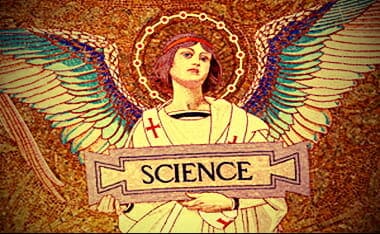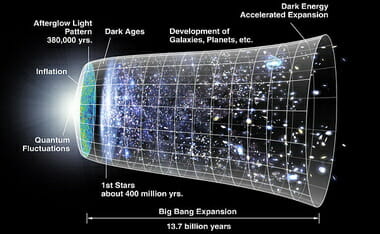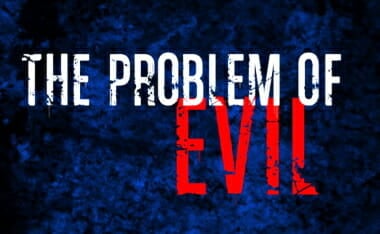Atheists reject evidence as illusory…
Why?
Because they “have to.”
I put these two ideas from separate fields of study together. Why I didn’t before is a mystery… but like with any field of study, you can go over the same topic again-and-again — you continue to learn. The first example come from biology and the natural sciences. Here are three examples of the beginning of my thinking:
- “The illusion of design is so successful that to this day most Americans (including, significantly, many influential and rich Americans) stubbornly refuse to believe it is an illusion. To such people, if a heart (or an eye or a bacterial flagellum) looks designed, that’s proof enough that it is designed.” ~ Richard Dawkins in the Natural History Magazine;
- “So powerful is the illusion of design, it took humanity until the mid-19th century to realize that it is an illusion.” ~ New Scientist Magazine (h/t, Uncommon Dissent)
- “Biology is the study of complicated things that give the appearance of having been designed for a purpose.” Richard Dawkins enlarges on this thought: “We may say that a living body or organ is well designed if it has attributes that an intelligent and knowledgeable engineer might have built into it in order to achieve some sensible purpose… any engineer can recognize an object that has been designed, even poorly designed, for a purpose, and he can usually work out what that purpose is just by looking at the structure of the object.” ~ Richard Dawkins, The Blind Watchmaker, 1996, pp. 1, and 21.
- “We can’t make sense of an organ like the eye without considering it to have a function, or a purpose – not in a mystical, teleological sense, but in the sense of an illusion of engineering. That illusion, we now know, is a consequence of Darwin’s process of natural selection. Everyone agrees that the eye is a remarkable bit of natural “engineering,” and that may now be explained as a product of natural selection rather than as the handiwork of a cosmic eye-designer or as a massive coincidence in tissue formation.” ~ Steven Pinker, via Edge’s “Is Science Killing the Soul.”
The important point here is that the Judeo-Christian [theistic] view would posit that we (and nature) is designed, and would notice it in ourselves and in nature. The atheist MUST reject design as an illusion because their worldview demands that chance cobbled together what we see… so dumb luck needs to be seen as opposed to design.
Steven Pinker summation:
Pinker’s newer book, The Blank Slate, revised his views on free will, in that he no longer thinks it’s a necessary fiction. The chapter on “The Fear of Determinism” takes an explicitly deterministic stance, and usefully demonstrates the absurdity of contra-causal free will and why we shouldn’t worry about being fully caused creatures. However, Pinker remains conservative in not drawing any conclusions about how not having free will might affect our attitudes towards punishment, credit, and blame,; that is, he doesn’t explore the implications of determinism for ethical theory. This, despite the fact that in How the Mind Works he claimed that “ethical theory requires idealizations like free, sentient, rational, equivalent agents whose behavior is uncaused” … We await further progress by Pinker. (Via Naturlism)
Daniel Dennett:
Dennett worries that there is good evidence that promulgating the idea that free will is an illusion undermines just that sense of responsibility many scientists and philosophers are worried about losing. Critics maintain that Dennett’s kind of free will, with its modest idea of “enough” responsibility, autonomy and control, is not really enough after all.
[….]
“It’s important because of the longstanding tradition that free will is a prerequisite for moral responsibility,” he says. “Our system of law and order, of punishment, and praise and blame, promise keeping, promise making, the law of contracts, criminal law – all of this depends on one notion or another of free will. And then you have neuroscientists, physicists and philosophers saying that ‘science has shown us that free will is an illusion’ and then not shrinking from the implication that our systems of law are built on foundations of sand.” (Via The Guardian)
Richard Dawkins, Lawrence Kruass, Christopher Hitchens:
Sam Harris:
Stephen Hawkings:
One of the most intriguing aspects mentioned by Ravi Zacharias of a lecture he attended entitled “Determinism – Is Man a Slave or the Master of His Fate,” given by Stephen Hawking, who is the Lucasian Professor of Mathematics at Cambridge, Isaac Newton’s chair, was this admission by Dr. Hawking’s, was Hawking’s admission that if “we are the random products of chance, and hence, not free, or whether God had designed these laws within which we are free.”[1] In other words, do we have the ability to make choices, or do we simply follow a chemical reaction induced by millions of mutational collisions of free atoms? Michael Polyni mentions that this “reduction of the world to its atomic elements acting blindly in terms of equilibrations of forces,” a belief that has prevailed “since the birth of modern science, has made any sort of teleological view of the cosmos seem unscientific…. [to] the contemporary mind.”[2]
[1] Ravi Zacharias, The Real Face of Atheism (Grand Rapids, MI: Baker Books, 2004), 118, 119.
[2] Michael Polanyi and Harry Prosch, Meaning (Chicago, IL: Chicago university Press, 1977), 162.
The bottom line is that free-will, self, freedom to be above and distinguish between actions, is all an illusion.
Why?
BECUASE if free-will existed… then this would be an argument f-o-r theism. F-o-r God’s existence. Like the founding director of NASA’s Goddard Institutes, Robert Jastrow’s description in his book of a disturbing reaction among his colleagues to the big-bang theory—irritation and anger.
Why, he asked, would scientists, who are supposed to pursue truth and not have an emotional investment in any evidence, be angered by the big-bang theory?
They had an aversion to the Big-Bang.
Because it argued F-O-R theism. F-O-R God’s existence.
Jastrow noted that many scientists do not want to acknowledge anything that may even suggest the existence of God. The big-bang theory, by positing a beginning of the universe, suggests a creator and therefore annoys many astronomers.
This anti-religious bias is hardly confined to astronomers.
As we see, the above persons in rejecting evidence of design in nature and consciousness, are doing so based on an aversion to “God evidence.” Another well-known philosopher John Searle notes this illusion as well:
All these people are misusing science and remaking it into “scientism.” AND, they are “not allowing a divine foot in the door,” as Dinesh D’Souza notes:
Scientism, materialism, empiricism, existentialism, naturalism, and humanism – whatever you want to call it… it is still a metaphysical position as it assumes or presumes certain things about the entire universe. D’Souza points this a priori commitment out:
Naturalism and materialism are not scientific conclusions; rather, they are scientific premises. They are not discovered in nature but imposed upon nature. In short, they are articles of faith. Here is Harvard biologist Richard Lewontin: “We take the side of science in spite of the patent absurdity of some of its constructs, in spite of its failure to fulfill many of its extravagant promises of health and life, in spite of the tolerance of the scientific community for unsubstantiated just-so stories, because we have [an] a priori commitment… a commitment to materialism. It is not that the methods and institutions of science somehow compel us to accept a material explanation of the phenomenal world, but, on the contrary, that we are forced by our a priori adherence to material causes to create an apparatus of investigation and a set of concepts that produce material explanations, no matter how counter-intuitive, no matter how mystifying to the uninitiated. Moreover, that materialism is an absolute, for we cannot allow a Divine Foot in the door.”
Dinesh D’Souza, What’s So Great about Christianity (Washington, DC: Regnery Publishing, 2007), 161 (emphasis added).
“Minds fit into an theistic world, not an atheistic one”
What are intentional states of consciousness? Are states of consciousness plausible on either a theistic or atheistic worldview? This clip shows the exchange between Dr William Lane Craig and Dr Alex Rosenberg on intentional states of consciousness in the world. On February 1st, 2013 at Purdue University, Dr Craig participated in a debate with Dr Rosenberg on the topic, “Is Faith In God Reasonable?” Over 5,000 people watched the event on the Purdue University campus along with tens of thousands streaming it live online from around the world.
For more on this, see my “quotefest” here: Evolution Cannot Account for: Logic, Reasoning, Love, Truth, or Justice












